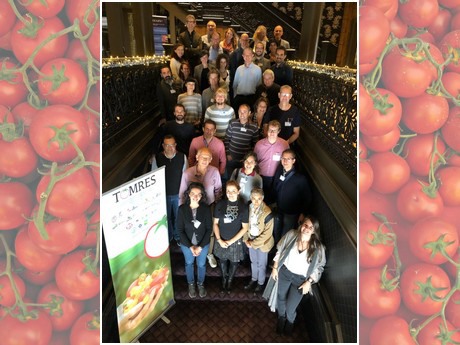During the 5th TOMRES EU project meeting in Dundee, Scotland, from 8-10 October 2019, partners and participating stakeholders discussed current outcomes of the different project activities after over two years.
To facilitate tomato breeding, scientists presented their results from: Establishing and analysing a core collection of tomato genotypes including accessions that were previously shown to outperform standard varieties for water and nutrient use efficiency, leading to the ranking of resilient tomatoes; Proofing root structure differences; Showing effects of supporting plant hormones and biostimulant; and Optimized management strategies. Experimental data of field as well as demonstration experiments were collected for a preliminary decision support system, while a consumer and farmer assay has been analysed to estimate the impact of TOMRES tomatoes for climate protection.

In addition to several scientific publications for academic and industrial experts, first technical papers for farmers were published in farm magazines in Germany and Romania. Further manuscripts with essential outcomes will follow, also on the basis of TOMRES ‘practice abstracts’ for farmers under the European Innovation Partnership "Agricultural Productivity and Sustainability" (EIP-Agri).
The ‘systematic map protocol’ for data analysis was prepared in the UK and first outcomes of the systematic mapping were presented, showing for instance major efforts in more conventional approaches (irrigation, fertiliser and crop or/and soil management) taking precedent over technology-based interventions including ‘smart’ methods involving bio-, chemo- or digitally-based methods, pointing to gaps / opportunities for future research and innovation investments.
The highlight of this year’s autumn meeting was the TOMRES stakeholder event resulting in valuable and constructive suggestions by the experts from industrial and academic stakeholders, such as Nunhems / BASF vegetable breeding, FoodDrinkEurope (the European food and drink industry association), The Spanish Research Council (CISC), and the Leibniz Institute of Vegetable and Ornamental Crops (IGZ) in Germany leading the European plant scientists’ working group on horticulture.
A unique opportunity of the meeting in Dundee were joint sessions with the partners from the Horizon 2020 twin-project SolAce: a stakeholder event and science breakout sessions in which issues of high interest and relevance to both projects were discussed.
Watch out for the next TOMRES project meeting in spring 2020 taking place in Naples, Italy.
For more information:
TOMRES
Coordinator:
Andrea SCHUBERT
Tel: (+39) 0116708654
Fax: 0116708658
[email protected]
Project Manager:
Elisa Peinetti
Tel: (+39) 011 6708824
Fax: 011 6708824
[email protected]
www.tomres.eu
